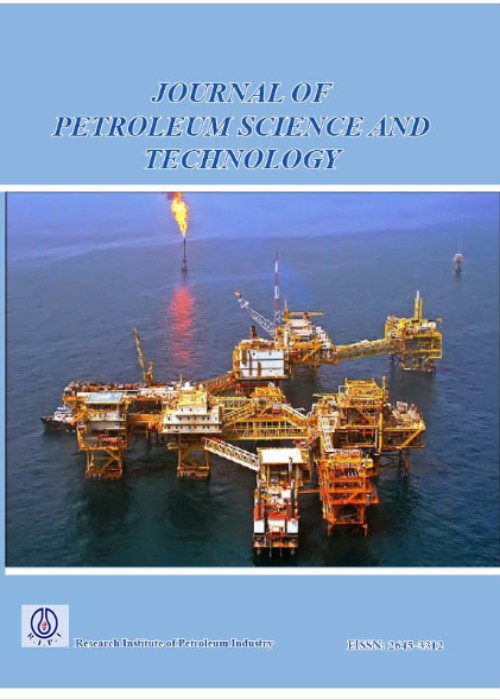The Application of Least Square Support Vector Machine as a Mathematical Algorithm for Diagnosing Drilling Effectivity in Shaly Formations
Author(s):
Article Type:
Research/Original Article (دارای رتبه معتبر)
Abstract:
The problem of slow drilling in deep shale formations occurs worldwide causing significant expenses to the oil industry. Bit balling which is widely considered as the main cause of poor bit performance in shales, especially deep shales, is being drilled with water-based mud. Therefore, efforts have been made to develop a model to diagnose drilling effectivity. Hence, we arrived at graphical correlations which utilized the rate of penetration, depth of cut, specific energy, and cation exchange capacity in order to provide a tool for the prediction of drilling classes.
This paper describes a robust support vector regression (SVR) methodology that offers superior performance for important drilling engineering problems. Using the amount of cation exchange capacity of the shaly formations and correlating them to drilling parameters such as the normalized rate of penetration, depth of cut, and specific energy, the model was developed. The method incorporates hybrid least square support vector regression into the coupled simulated annealing (CSA) optimization technique (LSSVM-CSA) for the efficient tuning of SVR hyper parameters. Also, we performed receiver operating characteristic as a performance indicator used for the evaluation of classifiers. The performance analysis shows that LSSVM classifier noticeably performs with high accuracy, and adapting such intelligence system will help petroleum industries deal with the well drilling consciously.
The problem of slow drilling in deep shale formations occur worldwide causing significant expense to the oil industry. Bit balling is widely considered as the main cause of poor bit performance in shale, especially deep shale are being drilled with water-based mud .Therefore, efforts have been made to develop a model to diagnose drilling ineffectivity/effectivity. Hence we arrived to graphical correlations which utilized rate of penetration, depth of cut, specific energy, and cation exchange capacity in order to provide a tool for prediction of drilling classes.
This paper describes a robust support vector regression (SVR) methodology that offers superior performance for important drilling engineering problems. Using the amount of cation exchange capacity of the shaly formations and also correlating them
to drilling parameters, such as normalized rate of penetration, depth of cut, and specific energy, model was developed.The method incorporates hybrid least square support vector regression and Coupled Simulated Annealing (CSA) optimization technique (LSSVM-CSA) for efficient tuning of SVR hyper parameters. Also, we performed Receiver Operating Characteristic as a performance indicator which used for evaluation of classifiers. Performance analysis shows that LSSVM classifier noticeably perform with high accuracy and adapting such intelligence system will help petroleum industry to dealing the well drilling consciously.
This paper describes a robust support vector regression (SVR) methodology that offers superior performance for important drilling engineering problems. Using the amount of cation exchange capacity of the shaly formations and correlating them to drilling parameters such as the normalized rate of penetration, depth of cut, and specific energy, the model was developed. The method incorporates hybrid least square support vector regression into the coupled simulated annealing (CSA) optimization technique (LSSVM-CSA) for the efficient tuning of SVR hyper parameters. Also, we performed receiver operating characteristic as a performance indicator used for the evaluation of classifiers. The performance analysis shows that LSSVM classifier noticeably performs with high accuracy, and adapting such intelligence system will help petroleum industries deal with the well drilling consciously.
The problem of slow drilling in deep shale formations occur worldwide causing significant expense to the oil industry. Bit balling is widely considered as the main cause of poor bit performance in shale, especially deep shale are being drilled with water-based mud .Therefore, efforts have been made to develop a model to diagnose drilling ineffectivity/effectivity. Hence we arrived to graphical correlations which utilized rate of penetration, depth of cut, specific energy, and cation exchange capacity in order to provide a tool for prediction of drilling classes.
This paper describes a robust support vector regression (SVR) methodology that offers superior performance for important drilling engineering problems. Using the amount of cation exchange capacity of the shaly formations and also correlating them
to drilling parameters, such as normalized rate of penetration, depth of cut, and specific energy, model was developed.The method incorporates hybrid least square support vector regression and Coupled Simulated Annealing (CSA) optimization technique (LSSVM-CSA) for efficient tuning of SVR hyper parameters. Also, we performed Receiver Operating Characteristic as a performance indicator which used for evaluation of classifiers. Performance analysis shows that LSSVM classifier noticeably perform with high accuracy and adapting such intelligence system will help petroleum industry to dealing the well drilling consciously.
Keywords:
Language:
English
Published:
Journal of Petroleum Science and Technology, Volume:8 Issue: 1, Winter 2018
Pages:
3 to 15
magiran.com/p1795016
دانلود و مطالعه متن این مقاله با یکی از روشهای زیر امکان پذیر است:
اشتراک شخصی
با عضویت و پرداخت آنلاین حق اشتراک یکساله به مبلغ 1,390,000ريال میتوانید 70 عنوان مطلب دانلود کنید!
اشتراک سازمانی
به کتابخانه دانشگاه یا محل کار خود پیشنهاد کنید تا اشتراک سازمانی این پایگاه را برای دسترسی نامحدود همه کاربران به متن مطالب تهیه نمایند!
توجه!
- حق عضویت دریافتی صرف حمایت از نشریات عضو و نگهداری، تکمیل و توسعه مگیران میشود.
- پرداخت حق اشتراک و دانلود مقالات اجازه بازنشر آن در سایر رسانههای چاپی و دیجیتال را به کاربر نمیدهد.
In order to view content subscription is required
Personal subscription
Subscribe magiran.com for 70 € euros via PayPal and download 70 articles during a year.
Organization subscription
Please contact us to subscribe your university or library for unlimited access!


